Research
Associates:
The
COSMOS project has been fortunate to draw on
the skills of many post-doctoral research associates
over its duration. The following is a list of
those who were members of the COSMOS team at
the close of the project in 2010.
Earlier
team members, who left before the end of the
project are listed here.
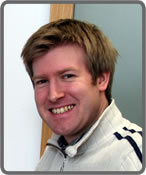
|
Dr.
Stephen Morris (COSMOS Project Manager)
CMMPE,
Department
of Engineering
Stephen
read Physics and Space Science at
Southampton University, where he obtained
a Masters degree in Physics, before
coming to the University
of Cambridge to study for a PhD
in Liquid Crystal Photonics at the
Department
of Engineering. After completing
his PhD in 2005, Stephen continued
as a Research Associate at CMMPE
working in collaboration with an industrial
partner to produce a new hybrid display,
which can be viewed in both low light
and high light level environments.
At present, he is currently involved
in the Basic Technology Programme
COSMOS which is aimed at developing
miniature tunable laser light sources
for next generation displays and photonics
applications. |
|
Junfeng
received his PhD from the Chinese
Academy of Sciences. For his PhD
he studied organic electric and
optoelectronic devices based on
organic metal complexes. After completing
his PhD in 2006, he worked on polymer
light-emitting electrochemical cells
as a postdoctoral researcher in
the Department of Physics, Umea
University, Sweden. In 2008, he
joined the Polymer
Synthesis Group (Melville Lab)
at the University of Cambridge as
a Research Associate, and is working
on polymer based solar cells and
light-emitting devices.
|
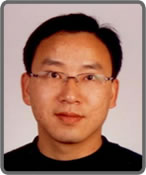
|
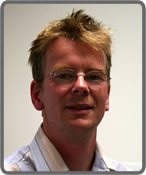
|
Oliver
received a Diploma degree in Physics
from the University of Frankfurt, Germany
and a Ph.D in Optoelectronics from the
University of Southampton. For his PhD
he conducted theoretical and experimental
work on DFB fibre lasers for telecommunication
and sensor applications. During his
time at Southampton University he also
worked on fibre optic sensors for the
oil industry at Sensor Dynamics Ltd,
Winchester. He is now a Reseach Associate
within the CMMPE
and Centre
for Photonic Systems research groups
in the Department
of Engineering, working on liquid
crystal lasing devices for fibre optic
telecommunication networks.
|
|
Phil
has a PhD in Condensed Matter Physics
(2003) and an MSci in Physics (1999),
both from Durham University. His PhD
studied the quantum tunnelling conduction
mechanisms in novel metal-polymer composites
and their applications in chemical vapour
sensing (electronic noses). He also
has postdoctoral experience in the fabrication
and applications of adaptive liquid
crystal devices. In particular, he has
developed adaptive lenses for applications
in 3D displays, optical tweezing and
adaptive optics for astronomy. He is
currently based within the CMMPE
research group in the Department
of Engineering, and is employed
on the COSMOS project, developing the
performance and applications of chiral
nematic liquid crystal lasers.
|
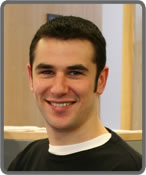
|
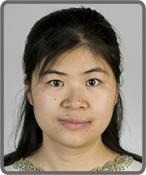
|
Yan
Ji received her MEng in the Department
of Materials in Tianjin University
(China) in 2001 and her PhD in the
Department of Chemistry in Peking
University (China) in 2006. Her doctoral
research focussed on peptide dendrimers
including synthesis, self-assembly
and biomimics. In June 2006, she joined
the BSS
group
(Cavendish
Lab) at the University
of Cambridge as a Research Associate,
and is working on liquid crystalline
shape memory polymers.
|
|
Dinesh's
current studies involve the fabrication
and characterisation of hybrid oxide-polymer
based thin film devices in the Opto-Electronics
group (Cavendish
Lab). He got his MTech degree
(2002) from D.A.V.V., Indore, India
and PhD degree (2007) from JNCASR,
Bangalore, India. He has experience
of assembling and characterization
of high power DPSSL from his MTech
project. During his PhD he fabricated
1D and 2D optical position sensitive
detectors with a spatial resolution
of ~100 nm. His doctoral investigation
also involved steady state transport
length scales of photo-induced electrons
and holes in model polymer systems.
Presently, he is devising hybrid electronics
for electrically pumped high brightness
polymeric light sources as a part
of COSMOS.
|
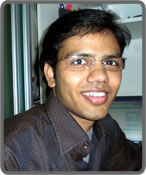
|
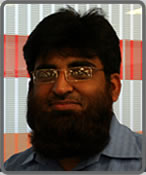
|
Qasim
obtained an MSc in Chemistry (2000)
from Quaid-I-Azam University Islamabad
(Pakistan) researching natural product
synthesis (Isocumarine and its dihydro-derivatives).
This was followed by his MPhil in
Organic Chemistry (2002) from the
same institute. The research project
was based on synthesis of mesogens
comprising of Schiff's base analogues
derived from benzyl amine derivatives.
He was then appointed a lecturer in
Chemistry at APSC Rawalpindi. In 2008
he received his PhD in Chemistry from
Macquarie University Sydney (Australia).
His PhD involved the synthesis and
characterisation of liquid crystal
molecules possessing chiral scaffold
analogues e.g. Tröger's base.
The investigations of these chiral
bent cores were carried out on the
bases of their substitution patterns,
simultaneous resolution and the methodologies
to evolve as mesogens through covalent
and hydrogen bonding interactions.
The characterisations of the resultant
molecules were carried out by means
of NMR, DSC and hot-stage polarised
microscopy studies. |
|
Juergen
obtained his diploma (1996) and doctorate
(2000) in physics at the Albert-Ludwigs
University in Freiburg, Germany. His
diploma thesis was on structure formation
in crystallising polymer melts, his
doctoral thesis on viscous and elastic
properties of polymeric and low molar
mass nematic liquid crystals. He then
stayed in Freiburg to investigate
the photonic properties of cholesteric
liquid crystals (spontaneous emission
and laser emission in dye doped systems,
photonic defect modes, cholesteric
elastomers as mechanically tunable
photonic band gap materials). This
was a joint project of the polymer
physics group (Prof. Gert Strobl)
and the Institute for Macromolecular
Chemistry (Prof. Heino Finkelmann).
|
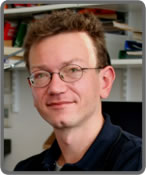
|

|
Bodo's
research interests are focused on
spectroscopic investigations of excited
states in polymeric semiconductors
to achieve a complete understanding
of their role in devices like polymer
light emitting diodes, optical and
future injection lasers. At the same
time, he uses this knowledge to realize
new and to improve the performance
of existing organic devices.
Bodo
studied chemistry and continued his
Phd in Cologne. He was working on
organic light-emitting diodes, optically
pumped organic lasers and future organic
injection lasers. The research during
his PhD was carried out with 5 cooperation
partners in a project similar to the
COSMOS project. He became a COSMOS
member after finishing his PhD in
2009 and starting as a Research Associate
in the group of Richard H. Friend.
|
Previous
members:
Guoli
Tu
Myoung-Hoon Song
Catherine Dobson
Sonja Findeisen-Tandel
|
|
|